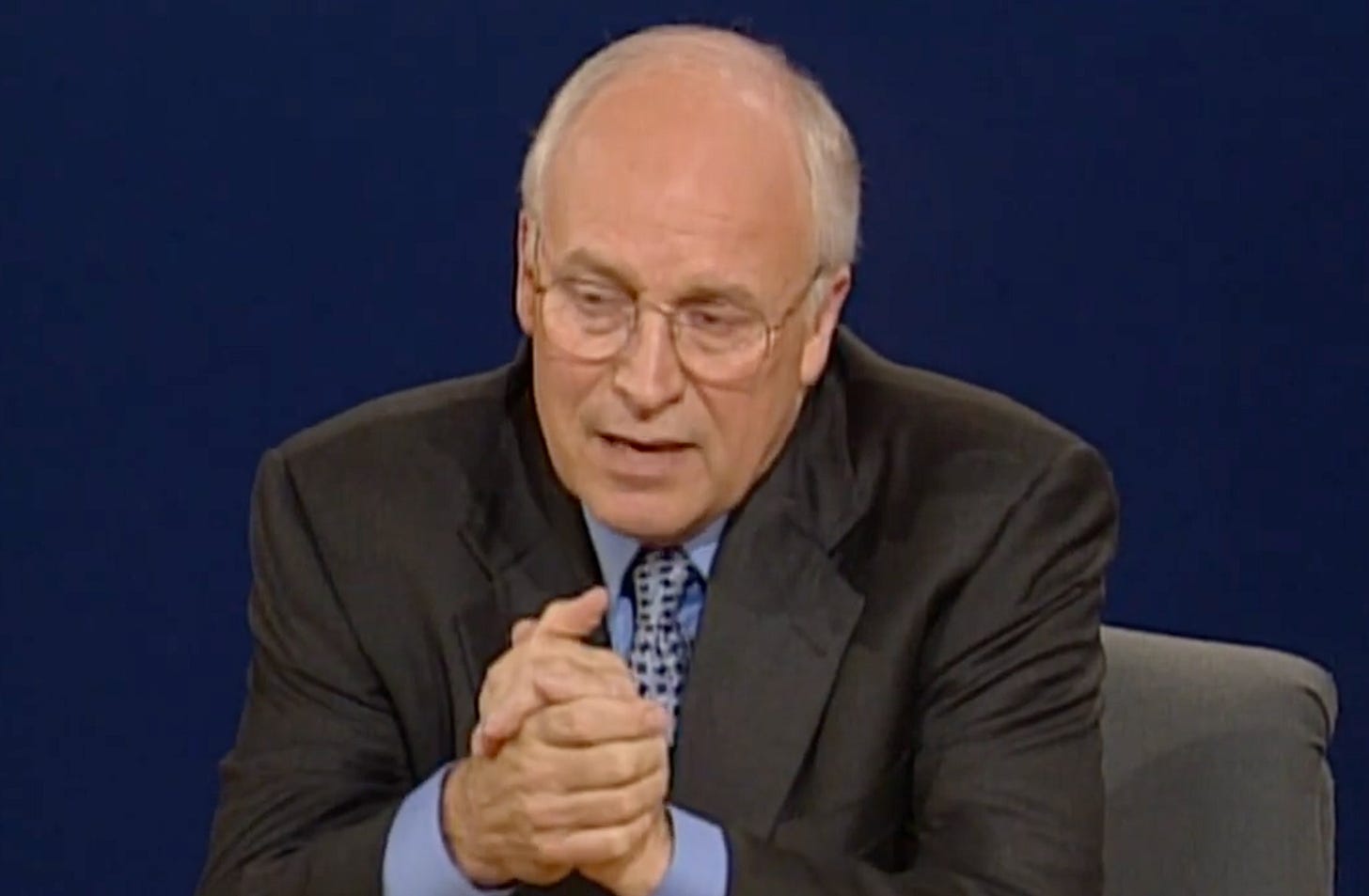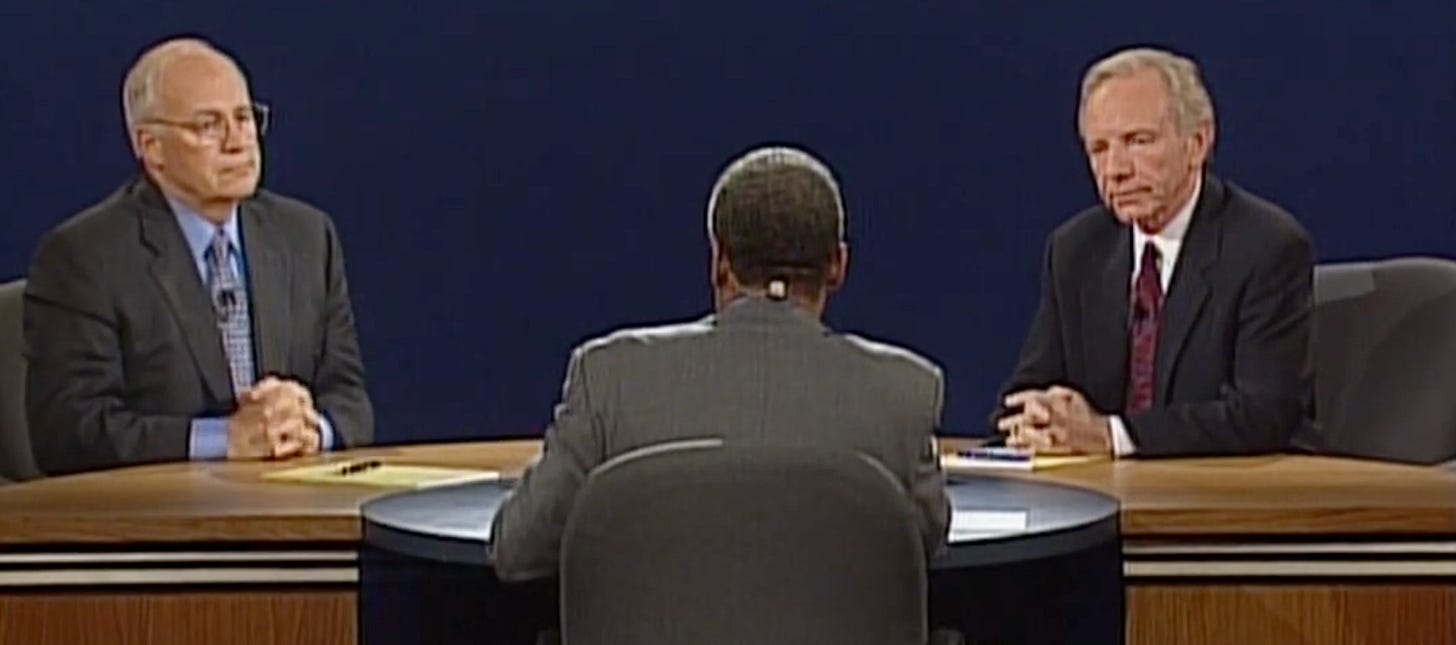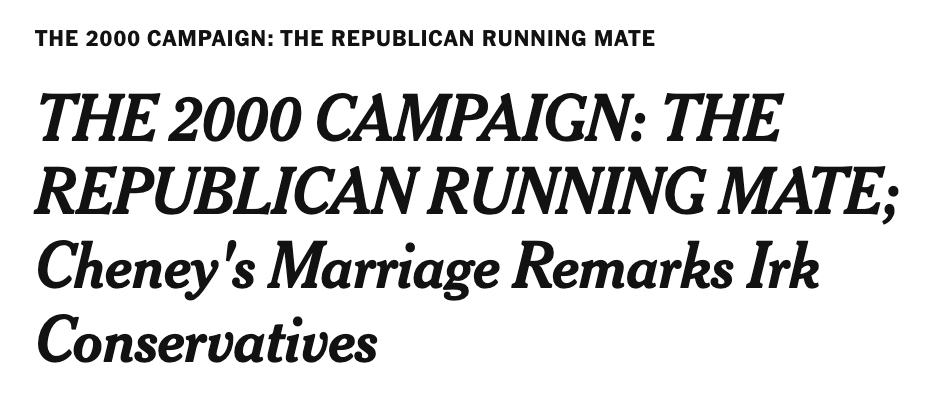Dick Cheney, who died Monday, was an early GOP voice for treating same-sex couples fairly
"Freedom means freedom for everybody," Cheney said at the 2000 vice presidential debate. It doesn't change his legacy, but it is something we should remember today.
Dick Cheney died on Monday.
The former vice president who helped unleash many of the norm-breaking and unconstitutional excesses of the George W. Bush administration on the world, his legacy will be linked to those horrors — and the many that have followed in their wake through to today.
To take in the news, I was awaiting the words of two journalists in particular, Barton Gellman and Spencer Ackerman. They both came through, as expected.
Gellman, whose Angler book on Cheney is key to my understanding of Cheney, is the lead author, joined by Marc Fisher, of The Washington Post’s obituary. (Neither man works for the Post any longer.)
Ackerman, whose Reign of Terror book is emblematic of Ackerman’s deep understanding of the role Cheney played in shaping today’s America, published this piece at The Nation on Tuesday.
Despite the horrors of Cheney’s legacy — and they will continue being discussed in the days to come — one of my early memories of the man will stick with me forever and should not be lost today: His comments about same-sex couples in the 2000 vice presidential debate.
Coming months after civil unions were deemed acceptable for protecting same-sex couples’ relationships in Vermont and just four years after then-president Bill Clinton signed the Defense of Marriage Act into law, the vice presidential candidates, Cheney and Joe Lieberman, were asked, “Should a male who loves a male and a female who loves a female have all the constitutional rights enjoyed by every American citizen?”
Lieberman, as Al Gore’s running mate for the Democrats, informed moderator Bernard Shaw from CNN, that it was a “[v]ery current and difficult question.”
Cheney, as George W. Bush’s running mate for the Republicans, began his response with an answer that echoed out for years:
The fact of the matter is we live in a free society, and freedom means freedom for everybody. We don’t get to choose, and we shouldn’t be able to choose and say you get to live free and you don’t. That means people should be free to enter into any kind of relationship they want to enter into. It’s no one’s business in terms of regulating behavior in that regard.
Now, this wasn’t the end of his answer, and I’ll get to that, but I do want to highlight that this statement came three years before the U.S. Supreme Court struck down sodomy laws in Lawrence v. Texas and while the standing precedent of the Supreme Court in Bowers v. Hardwick was that such laws were constitutional. In other words,
Cheney, whose daughter Mary is a lesbian, was way out in front — even of the Supreme Court — just with that first part of his answer.
Then, there was the second part. As Cheney put it: “The next step then, of course, is the question you ask of whether or not there ought to be some kind of official sanction of the relationships or if these relationships should be treated the same as a traditional marriage.“
Lieberman had gone first and given a Vermont-style answer, saying that while he had backed efforts “extending … rights to gay and lesbian Americans,“ he also supported “the traditional notion of marriage as being limited to a heterosexual couple.” Noting that he had “friends who are in gay and lesbian partnerships who said to me, isn’t it fair. We don’t have legal rights to inheritance, visitation when one partner is ill, to health care benefits,” Lieberman concluded, “That’s why I’m thinking about it. My mind is open to taking some action that will address those elements of unfairness while respecting the traditional religious and civil institution of marriage.”
That was not a good answer from a Democrat, even in 2000, but it was not a shockingly bad answer at the time.
When Cheney went on to that part of his answer, however, he surprised everyone even more than during the first part of his answer.
That’s a tougher problem. That’s not a slam dunk. The fact of the matter is that it is regulated by the states. I think different states are likely to come to different conclusions, and that’s appropriate. I don’t think there should necessarily be a federal policy in this area. I try to be open minded about it as much as I can and tolerant of those relationships. And like Joe, I’m also wrestling with the extent to which there ought to be legal sanction of those relationships. I think we ought to do everything we can to tolerate and accommodate whatever kind of relationships people want to enter into.
It was, in 2000, a remarkable statement. Cheney had, essentially, said that DOMA was bad, that he supported the right of states that wanted to provide marriage rights for same-sex couples, and that “we ought to do everything we can to … accommodate” same-sex couples’ relationships — although he was not set at that time on the “extent” of “legal sanction” they should be given.
The fallout from the right was noted at the time:
Now, once in office, Cheney ultimately allowed Bush, Karl Rove, Ken Mehlman, and others to use anti-gay politics to help them secure Bush and Cheney’s re-election on the winds anti-gay sentiment — and the votes on amendments in many states banning same-sex couples’ marriages, alongside Bush’s support for a Federal Marriage Amendment.
Even then, though, it should be noted that Cheney spoke out, reiterating his view and noting, “The states have made that fundamental decision of what constitutes a marriage“ — while nonetheless stating that “the president makes policy for the administration.“
The Federal Marriage Amendment effort went nowhere, and, instead, the nation moved toward Cheney’s view, with the Supreme Court striking down DOMA in 2013 and ultimately ruling in 2015 that the remaining state marriage bans — several of which had been passed by voters in that 2004 election — were unconstitutional.
Now, a decade later, the court is set on Friday to consider whether to hear a longshot request, rejected by lower courts, from a former county clerk to revisit that decision — making Cheney’s 2000 comments perhaps more notable today than they otherwise might be.
As I wrote at the time of the U.S. Court of Appeals for the Sixth Circuit’s decision in the case, even if the Supreme Court wanted to revisit the Obergefell v. Hodges decision, Kim Davis’s case is an extremely poor vehicle to do so — as the brief in opposition detailed.
But, it is 2025 and this Supreme Court has gone where many said it wouldn’t in other cases, so many people have spilled significant virtual ink on the request from Liberty Counsel’s Mat Staver on behalf of Kim Davis to “revisit and reverse“ Obergefell.
In that light and in this moment, maybe the former vice president’s 25-year-old comments are themselves worth revisiting today.
They do not fundamentally change Dick Cheney’s legacy, and they don’t even particularly change my view of him, but — in that 2000 debate — he made a statement that made a difference.
And that should not be forgotten in this moment when speaking out and standing up is more important than ever.






If I'm being frank: as a queer person, I could not care less about Cheney's history here. I don't have any interest in someone who defends us while upholding global violence against people of color -- considering the existence of queer people of color, all it does is highlight how disingenuous that support is.
At least he was consistent in the old Republican party’s view on freedom. A society is not being free unless everyone is free. While his only motivation was having a gay daughter, at least he stood up for her. As a trans woman, I find that a factor in acceptance and subsequent support is largely based on having met a trans person and realizing that we are not as different as the misinformation would have one believe. Therefore, however the ball gets moved forward is a good thing. Nobody is perfect and for a guy with his reputation to support gay rights had to have moved the ball forward, even if only by a small amount.